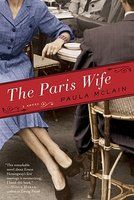
There was never a moment when The Paris Wife (Ballantine) was not going to be a huge seller. The writing here is sharp and terrific, but the subject matter clinches things. The  story of Ernest Hemingway’s relationship with his first wife, Hadley, would have been of great interest even without the success of Loving Frank (2007), Nancy Horan’s explosive bestseller about Frank Lloyd Wright and his mistress. But with Loving Frank paving the way, there was going to be no stopping The Paris Wife. (And yes: that is a blurb from Horan on the cover of McLain’s book.) Both books were edited by Random House executive editor Susanna Porter. Porter is said to have paid “north of half a million” for North American rights to the debut novel. From the early signs, though, Porter’s instincts were right.
story of Ernest Hemingway’s relationship with his first wife, Hadley, would have been of great interest even without the success of Loving Frank (2007), Nancy Horan’s explosive bestseller about Frank Lloyd Wright and his mistress. But with Loving Frank paving the way, there was going to be no stopping The Paris Wife. (And yes: that is a blurb from Horan on the cover of McLain’s book.) Both books were edited by Random House executive editor Susanna Porter. Porter is said to have paid “north of half a million” for North American rights to the debut novel. From the early signs, though, Porter’s instincts were right.
McLain’s jazz age love story is perfect from the beginning. “The very first thing he does is fix me with those wonderfully brown eyes and say, ‘It’s possible I’m too drunk to judge, but you might have something there.’”
Of course, it’s not all wonderfully brown eyes and strains of jazz. You know going in that The Paris Wife is going to end badly. After all, before Hemingway killed himself in 1961, there would three wives after Hadley. The book concerns itself mainly with the five mad years the couple spent in Paris and includes the birth of their son, John Nicanor Hemingway (known as Bumby), who would one day grow to be the father of Mariel and Margeux Hemingway.
The marriage came to an end when Hadley discovered the other woman, the journalist Pauline Pfeiffer. Hadley and Hemingway were divorced within the year. In between is a heartbreaking stream of pain and near misses. This is, after all, the woman about whom Hemingway wrote, “I wished I had died before I ever loved anyone but her.”
Though The Paris Wife is, of course, fiction, sometimes it’s difficult to keep in mind. McLain delivers Hadley’s voice so perfectly, it’s easy to forget that the 28-year-old St. Louis virgin that Hemingway first married didn’t have much of a voice: at least, history doesn’t give her one. McLain has repaired that quite completely. ◊
Linda L. Richards is editor of January Magazine and the author of several books.

Leave a Reply